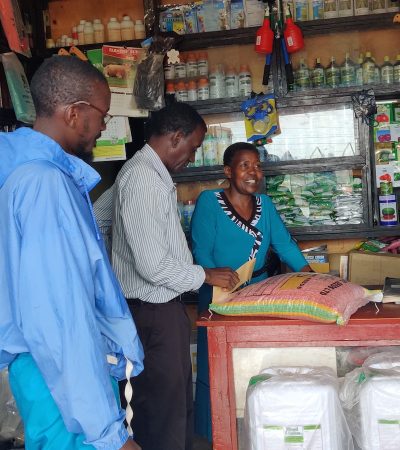Every year, Uganda’s universities graduate more than 60 students with degrees in nutrition and high hopes of helping their local communities tackle challenges such as undernutrition, micronutrient deficiencies and overnutrition. Although the universities’ curricula provide graduates with a solid theoretical grounding in nutrition, it hasn’t always been easy to put classroom learning into practice. Universities in Uganda rarely provide training on practical implementation skills such as leadership, work planning, project management and monitoring, all of which are essential for reaching nutrition objectives on time and on budget in the field.
Now, an innovative nutrition fellowship program is strengthening graduates’ abilities to put their knowledge to work and building the capacity of the next generation of Ugandan nutrition leaders. With support from Feed the Future, the Food and Nutrition Technical Assistance III (FANTA) project established the Uganda Nutrition Fellowship program in 2013 to enhance the skills of nutrition graduates by providing them with a unique mix of practical experience, professional development, leadership training, knowledge sharing and mentorship.
“Implementing the multisectoral national agenda for nutrition in Uganda calls for strengthening nutrition professionals’ capacities to plan, implement and monitor nutrition programs,” says Brenda Namugumya, a nutrition specialist with FANTA. “Each nutrition fellow in our program is linked to a host organization, such as the Ministry of Health, World Vision, Nyakibale Hospital and the Community Connector Project, where they support the application of multisectoral nutrition interventions within the mandate of these organizations.”
Over the course of 12 months, eight Fellows selected in 2013 cultivated skills in nutrition education, case management, capacity building, policy development and community mobilization. Fellows also attended professional development workshops, which gave them the opportunity to enhance their skills in communication, leadership and team building.
One of the Fellows, Miria Twinomugisha, wants to be a leader in nutrition in Uganda and focus on improving the nutritional status of children under 24 months and women of reproductive age. “They are the two groups critical to breaking the cycle of undernutrition and poverty,” she says.
Through the Fellowship program, Miria has built experience conducting community outreach, performing nutrition assessments and counseling, and coordinating and supporting government programs. Her host organization is the USAID-funded Community Connector Project, which works with local governments to integrate agriculture and nutrition at the community and household levels.
“I have gained enormous experience in working with different local government levels in the implementation of the Uganda Nutrition Action Plan; poverty reduction campaigns; capacity building; and training in nutrition assessment, counseling, water, sanitation and hygiene, livelihoods and agriculture, rural development and handling gender-related issues,” Miria says.
The Uganda Nutrition Fellows are graduating in August 2014. Some of them, like Isaac Baigereza, will stay on as full-time employees at their host organizations. As of July, Isaac will be coordinating the World Vision nutrition response to refugees in Ajumani in northern Uganda. World Vision says that their organization “benefited profoundly” from the skills and experience Isaac gained through his fellowship.
For the second year of the Uganda Nutrition Fellowship program, FANTA anticipates accepting up to 12 new fellows who will have even more extended and enriching placements within host organizations.
This program is scaling up Uganda’s nutrition expertise, while also advancing the country’s multisectoral nutrition agenda at the national, regional, district and community levels. Today’s graduates will be tomorrow’s leaders in the fight against malnutrition and for a healthier future for Uganda.




